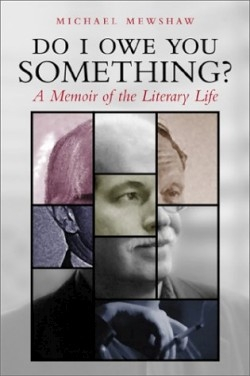Do I Owe You Something?
A Memoir of the Literary Life
Writers spend long hours alone. Because the act of writing is usually done in isolation, there remains a mystery about the process. An aspiring athlete can go to a game and watch an idol in action, studying the master’s jumpshots to imitate later. But no one watches a writer at work. All the aspiring writer has to study is the final outcome—the book, the poem—which is sort of like trying to learn how to play basketball by reading the box scores.
Perhaps the isolation of writing helps to explain, in part, the peculiar relationships that often exist between writers. Aspiring writers seek out mentors to guide them through the mysteries, and accomplished writers seek out other writers, someone else who works in isolation on a project intended for public consumption.
Do I OweYou Something is a fascinating glimpse into these relationships, complete with touching tales of kindness and friendship, and the drama of personal and literary feuds that sometimes erupt. The author devotes chapters to the writers with whom he has come into contact while creating his own career, including many of the literary giants of the second half of the twentieth century: William Styron, Robert Penn Warren, Gore Vidal, Mary McCarthy, Norman Mailer, and a host of others. The portrait of Gore Vidal is particularly touching. Often maligned as elitist and arrogant, Vidal emerges here as a much fuller person, arrogant at times, afraid and confused at others; in short, a real person.
Like many writers, Mewshaw knew from an early age that “I had no choice, no real alternative, I had to become a writer.” Also, however, like many other youngsters who come to this realization, he didn’t know any real writers, nor would he, really, until he stumbled upon George Garrett at the University of Virginia where Mewshaw was attending graduate school. The author freely admits that he owes Garrett a huge debt, for Garrett listened to a very confused young man tell him that he would not be attending Garrett’s seminar because he had decided to drop out of school. When Garrett discovered that Mewshaw was attending school on a fellowship, he offered some practical advice: “A free ride and you’re throwing it away… For someone who wants to be a novelist, that’s nuts. Why not live off the university’s money, stroll through your classes, and concentrate on writing until they catch on and throw you out?” And so, with those words offered over a shared bottle of vodka behind closed office doors, a literary career was born.
The author of more than a dozen novels and books of nonfiction, Mewshaw has spent most of his writing life abroad, primarily in Italy. His memoir, then, becomes an invaluable asset in understanding the literary expatriate experience, which now is both vastly different than the life Hemingway described, and yet also strangely familiar. In this memoir, Mewshaw attempts to repay some of his literary debts, to say thanks the way a writer knows best: through the written word. Readers will thank Mewshaw for this book.
Reviewed by
Erik Bledsoe
Disclosure: This article is not an endorsement, but a review. The publisher of this book provided free copies of the book to have their book reviewed by a professional reviewer. No fee was paid by the publisher for this review. Foreword Reviews only recommends books that we love. Foreword Magazine, Inc. is disclosing this in accordance with the Federal Trade Commission’s 16 CFR, Part 255.

